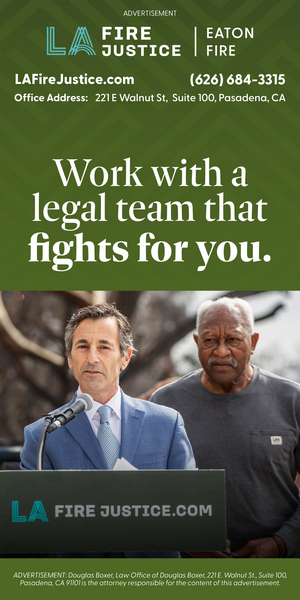Altadena Now is published daily and will host archives of Timothy Rutt's Altadena blog and his later Altadena Point sites.
Altadena Now encourages solicitation of events information, news items, announcements, photographs and videos.
Please email to: Editor@Altadena-Now.com
- James Macpherson, Editor
- Candice Merrill, Events
- Megan Hole, Lifestyles
- David Alvarado, Advertising


Wednesday, July 2, 2025
Lawmakers Wanted A New Infrastructure Agency To Operate In Secret. Why They Backed Down
By Yue Stella Yu, CALMATTERS

Construction teams work at the Quito Village Development Project in Saratoga on April 13, 2023. Photo by Martin do Nascimento, CalMatters
California lawmakers wanted to create a nonprofit agency authorized to borrow limitless taxpayer money to finance infrastructure projects — all while shielding most of its operations from the public eye.
Sponsored by state Treasurer Fiona Ma, SB 769 would create the Golden State Infrastructure Corporation, a nonprofit organization within the treasurer’s office that would use public and private financing for projects from transportation to housing.
The measure initially sought to exclude virtually all of the nonprofit’s records from public disclosure and allow the organization to make decisions behind closed doors.
That kind of authority deserves public scrutiny, good government groups argued, especially as corruption scandals plagued state agencies in recent decades. The proposal follows state officials’ efforts in recent years to shroud themselves in secrecy by using burner phones and non-disclosure agreements and by introducing measures to reduce public access to records and meetings.
After good government advocates and legislative analysts raised transparency concerns, lawmakers on Tuesday approved a new version of the bill that narrows the scope of documents that would be exempt from public disclosure, though it would still allow some to remain secret.
“This is exactly the kind of business (of) the state the public has a vested interest in being able to monitor. Excessive secrecy will only undermine public trust in the corporation,” the First Amendment Coalition and Oakland Privacy wrote in a joint letter to lawmakers last month.
The nonprofit would be overseen by a five-member board including the treasurer, controller and other state appointees.
The proposal would give the organization full discretion over its finances and would not cap how much debt it can incur. The state would also not be held liable for the organization’s financial decisions.
Some documents would still be secret
Under the revised legislation, the nonprofit would only be allowed to keep records private if they are corporate financial documents or “critical infrastructure information” that has not been made public. The group would also only be able to hold closed sessions while discussing those records.
“I believe the amendments we are taking today strengthen the bill and strike the right balance,” Sen. Anna Caballero, a Merced Democrat who authored the measure, said in a hearing Tuesday. “It will ensure the success of the infrastructure fund while maintaining the type of open and transparent governmental body the public deserves.”
Neither Caballero nor Ma responded to CalMatters’ request for comment Tuesday on why they sought to keep deliberations and records secret.
The initial sweeping exemptions went unnoticed for months as the measure sailed through the Senate with no lawmaker raising transparency concerns. The only two senators to vote against the legislation — Sens. Brian Jones of San Diego and Steven Choi of Irvine, both Republicans — did not cite the exemptions as part of their concern.
When asked about the lack of disclosure, Jones said in a statement that he’s deeply opposed to the entity “being completely exempt from the Public Records Act, especially in California, where government is already notorious for its lack of transparency.”
Choi spokesperson Kelley Rooney told CalMatters: “Senator Choi has consistently voted in favor of legislation that promotes government transparency and public input in the decision-making process.”
Ginny LaRoe, advocacy director of the First Amendment Coalition, told CalMatters she only flagged the proposed exemptions after the measure arrived in the Assembly. She said she wished lawmakers had raised the issue early on in the legislative process.
“We would have better policy debates, and ultimately, better policy if these key public interest provisions were analyzed and discussed early,” she said. “It’s probably not good government if we’re only really grappling with the public’s right to information and meetings at the very end stages of legislative proposals.”
While the proposal limits the nonprofit’s discretion to hold private meetings, Tracy Rosenberg, advocacy director of Oakland Privacy, told CalMatters she hopes the discretion wouldn’t be abused.
“We would hope that when taxpayer money is involved, you know, the (open meetings laws) should just apply without all these special carve-outs,” she said.
Other proposals to block transparency loom
The infrastructure proposal is only one of many this year that would exempt state entities from the open meetings law or reduce their public disclosure requirements, according to a CalMatters analysis. Most of those measures cite concerns about releasing sensitive, investigative or proprietary information as rationale.
At least three proposals would completely shield various entities such as task forces, working groups and advisory committees from the state’s open meetings requirement. They’ve all cleared the Assembly and are being debated in Senate committees.
Another proposal green lit by the Assembly is AB1103 by Democratic Assemblymember Chris Ward of San Diego. It would shield certain members of the Research Advisory Panel of California, a controlled substance study review group, from the open meetings law, and allow the group to continue meeting in private. Members of the group stopped meeting altogether in 2023 after being subject to open meetings requirements, arguing they could not publicly discuss studies without violating copyright and patent protections.
Additional measures aim to loosen public disclosure requirements and reduce the scope of records the state is required to release. One of them, AB 973 by GOP Assemblymember Josh Hoover of Folsom, would allow plastic manufacturers to ask CalRecycle to keep information they submit to the department private. Under the legislation, the department director could grant that request if they believe doing so “is not detrimental to the public interest.”
Two other measures, SB 495 by Sen. Ben Allen and AB 1339 by Assemblymember Mark Gonzalez, would require insurers to report more information to the state but would keep it from public disclosure.
And AB 1504, authored by Assemblymember Marc Berman, a Palo Alto Democrat, would have subjected the California Massage Therapy Council, a nonprofit created by the state to certify massage therapists, to the California Public Records Act.
Berman balked after the language drew fierce opposition from district attorneys and massage therapists, some of whom argued the requirements represent “government interference with the right of private parties” and would identify the council as a “quasi-public entity” 16 years after it was created. His current proposal merely “encourages” the council to make its information public.
“Despite the significant amendments, I still believe that greater transparency is essential for this Council to remain trusted and effective,” Berman said in a Monday hearing.
CalMatters.org is a nonprofit, nonpartisan media venture explaining California policies and politics.
Altadena Calendar of Events
For Pasadena Events, click here











